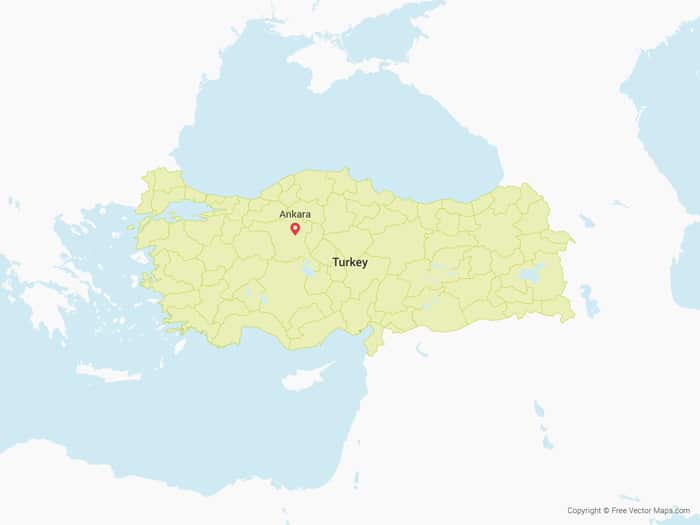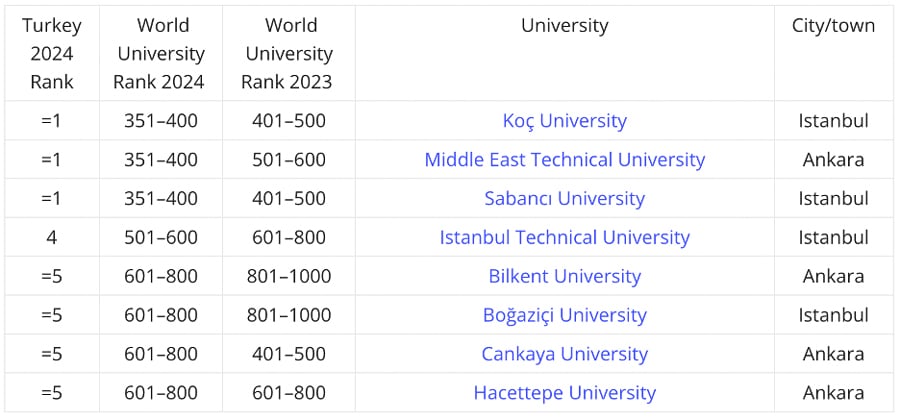Market snapshot: The international student market in Türkiye
- Türkiye’s economy has been struggling for the past two years, but demand remains strong for study abroad, especially for affordable programmes
- Only 1 in 3 Turkish high school graduates find a place in a domestic university
- Scholarships and work-while-studying opportunities top the list of Turkish students’ priorities
FAST FACTS
Capital: Ankara
Population: 86 million (2024) – the world’s 18th largest
GDP: US$905.84 billion
Currency: Turkish lira (TRY)
Language: Turkish
Main language of instruction: Turkish, but some universities instruct in English, French and German and provide a preparatory year for students who need it.
Religion: 99% Muslim
Median age: 33
Geography: Türkiye borders the Black Sea, between Bulgaria and Georgia, as well as the Aegean Sea and the Mediterranean Sea, between Greece and Syria
Largest cities: Istanbul (14.8 million residents), Ankara (3.5 million) Izmir (2.5 million)
Outbound students: 52,170 (UNESCO)

Türkiye has long been on the radar of school and university recruiters, and for good reason. Strong demand among Turkish students for study abroad is fuelled by capacity issues in their higher education system. In 2022, for example, of 3 million high school graduates who took a university placement exam, only 1 in 3 (29%) gained entrance to a four-year university or two-year vocational programme.
A further indication of Türkiye’s potential are the significant, recent educational improvements in the country. Türkiye has always had lower secondary and tertiary attainment than the OECD average but has made very impressive gains. The OECD points out that:
“Between 2008 and 2018, Türkiye experienced the second-largest increase in attainment of at least upper secondary education among OECD countries. Furthermore, growth in tertiary attainment has been particularly substantial, more than doubling to 33% over the same period, the largest increase in the OECD.”
Still, many Turkish families remain unsatisfied with the quality of secondary education and there is strong demand for K-12 options abroad. The US Trade Department notes that, “Through marketing efforts, Turkish student representation at U.S. boarding schools has increased in recent years … in 2019, over 400 Turkish students pursued their studies at U.S. boarding schools, making the U.S. the second most popular destination for boarding schools after the U.K.”
When recruiting in Türkiye, it’s important to know that English proficiency is quite low – the EF Index rates Turkey the 33rd lowest of 34 European countries. For this reason, pathway and foundation programmes could be crucial for easing students into studies abroad, and English-language training providers also have strong opportunities in the market.
About the name change
In 2021, President Recep Tayyip Erdogan asked for his country’s name to be changed from Turkey to Türkiye, saying that “The word 'Turkiye' represents and expresses the culture, civilisation, and values of the Turkish nation in the best way.” His government, and the Turkish people, had long been aware that in English, the word “turkey” describes a large bird traditionally eaten on religious holidays and the president’s request also stemmed from the issues with that translation. The UN promptly accepted the request.
State of the economy
Türkiye enjoyed a strong post-COVID recovery but devastating earthquakes in February 2023 affected people in many regions and buildings. The World Bank reports that:
“Direct losses are estimated at $34.2 billion, but the reconstruction needs could be double. The earthquakes added pressures to an increasingly fragile macro-financial situation. Pre-election spending and reconstruction efforts are expected to support growth, which is forecast at 3.2% in 2023 and 4.3% in 2024.”
Soon after the earthquakes, President Erdogan launched a contentious economic experiment in an effort to counter high inflation and distribute income more across income classes. For example, his government:
- Raised interest rates from 8.5% in May 2023 to 42.5% in December 2023;
- Raised the minimum wage by 49%;
- Increased pensions by 38%;
- Increased civil servants’ salaries by 49%.
So far, the experiment has not delivered the results President Erdogan hoped for. The lira secured the unenviable position of second-worst performing currency in the world last year (after the Argentine peso), depreciating by over 50% against the US dollar. Many Turks live below the poverty line and are struggling to pay for food and everyday costs of living.
The lira’s depreciation is important for foreign educators to keep in mind. It is already affecting outbound travel trends, not least because in August 2023, to encourage financial stability, Türkiye’s banking watchdog BDDK prohibited credit card payments by instalment for travel abroad, including fees as flights, travel agencies, and hotels/rent. Tour operator Cem Polatoglu told Reuters: “Almost all of my clients were paying by instalments. The number of people who can pay this amount [of an average trip for two costing US$1,850] in one go is very few.”
In a separate 2023 Reuters interview, Istanbul barber Hakim Ekinci explained that he could no longer support President Erdogan’s party, saying:
“I want the dollar exchange rate to decline (after the elections). I want the price of petrol to fall. I want inflation to fall. I want to go back to my life of five or six years ago. I want to be able to go on a picnic, travel abroad.”
Because of the financial turmoil, many Turkish students will be looking at affordable study abroad options and may have to have a scholarship offer to accept a place in a foreign university. The Hurriyet Daily News cites an unnamed survey that found that “95 percent of [Turkish] students when choosing a university is to be able to work while studying and the variety of scholarship opportunities.” Canada is an increasingly popular destination, the survey found, largely because of its in-study and post-study work opportunities.
Türkiye is a major exporter of agricultural products, textiles, cars and transportation equipment, iron and steel, construction materials, electronics, and home appliances. Its top trading partners are Germany, China, and Russia.
Outbound flows
UNESCO data show that Germany is the top destination for Turkish students (about 12,000) and that Türkiye is the fastest growing source of students for German institutions. Türkiye has in recent years vied with Russia for the #5 spot in Germany’s most important markets – but based on current growth trends depicted in the table below, it may now have surpassed Russia.

The US is the next largest enroller of Turkish students (just over 8,000). Türkiye is in the top 20 source markets for US institutions and is the third largest European market for them after the UK and Germany.
About half of Turkish students in the UK are studying at the graduate level.
About 4,000 Turkish students are enrolled in UK universities, Italy, France, and Canada each enrol about 2,500.
Secondary school
Turkish students attend secondary school for four years (Grades 9, 10, 11, 12) and their school year is from mid-September to mid-June. The Ministry of National Education (MEB) overseas the education system.
Private schools follow the same curriculum as public schools and the language of instruction is Turkish as well.
Most international schools are in Ankara and Istanbul. A list of top schools can be found here.
Higher education system
There are 129 public and 75 private (foundation) universities in Türkiye enrolling more than 8 million students, mostly at the undergraduate and vocational level. Just over 350,000 are enrolled in graduate programmes and another 110,000 are in doctorate programmes. Students pay a small fee (between 100 and 4,000 euro per year) to attend public university; private university tuition is higher, ranging from 12,000 to more than 20,000 euro a year. A significant proportion of private university students can attend their institution thanks to having received a merit-based scholarship.
In Türkiye, bachelor’s programmes are 4 years and masters are 2 years.
There are about 50 universities in Istanbul enrolling roughly 350,000 students, and 20 in Ankara enrolling more than 200,000. Izmir is also an important university city, with 9 universities and more than 100,000 post-secondary students.
Times Higher Education profiles top universities in Türkiye here and produced this accompanying chart.

Market opportunities
Though Türkiye’s population is aging quite rapidly, nearly half of the population is currently under the age of 30; a quarter are aged 15-29. This youth demographic represents a large recruiting pool for foreign educators given that Türkiye’s population is the 18th largest in the world.
Turkish students learn whether they have secured a spot in a domestic university in mid-July when they get the results of their entrance exams. This means that June, July, and August are especially good times for foreign educators to increase their outreach and campaigns as many parents will be preparing for the possibility that their children will fail to get a place in a university in Türkiye.
In 2022, Canan Severoğlu, the founder of education agency Geo Global Education Organization spoke at ICEF Virtual Eurasia and explained that despite their economy’s precarious state and the impact this has on household finances, Turkish students remain very interested in study abroad :
“More and more families are so price sensitive right now. Agencies in Türkiye are experiencing a lot of workload after the pandemic due to the accumulation of students who want to study abroad. When new graduates who prefer to study abroad, as opposed to joining the workforce in Türkiye, are added to this accumulation, I would say that agencies have also returned to their pre-pandemic intensity [of demand].”
According to the US Trade Department, and based on data from the Turkish Fulbright Commission, the following are the most popular fields of study for prospective Turkish students:
- Engineering, computer science, and other technical fields
- Business administration and economics (especially MBA programs in finance, marketing, and international business)
- English as a second language
- Short-term certificate programs and/or summer programs
- Social sciences, humanities, and arts (mainly psychology, political sciences, architecture, and law)
- Mass communications (radio-TV, film & video production)
- Medicine and other medical fields (for the most part, advanced level residencies)
For additional background, please see:
- Get first-hand market insights and connect with agents from Türkiye and throughout the region at ICEF Eurasia, Instanbul, 25–27 March 2024
- “Report calls for a more diverse foreign student enrolment in the UK”
- "Turkish demand for study abroad remains strong despite economic crisis"
















